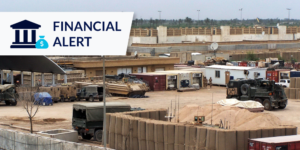
After a 2017 legal action resulted in an $8.4 million decision against United Infrastructure Projects FZCO, creditor Gilbane Federal — a subsidiary of Gilbane Building Company — has filed a petition to force United Infrastructure into involuntary Chapter 7 bankruptcy.
Gilbane Federal is seeking a total claim of $8,862,495 against the United Arab Emirates-based United Infrastructure, noting that the company is “generally not paying its debts as they become due” following a US District Court order to pay the judgment.
The legal action and subsequent claim stem from a contract Gilbane Federal was awarded by the United States Naval Facilities Engineering Command Pacific (NAVFAC) in order to perform all of the electrical and mechanical upgrades necessary on power plant upgrades at the US Navy’s Camp Lemonnier in the Republic of Djibouti.
In 2014, United Infrastructure signed a contract to provide all labor and materials as the subcontractor for the power plant upgrade project. However, the original legal action arose when Gilbane Federal claimed that United Infrastructure “failed to timely perform its work under the Subcontract in accordance with the Project schedule.”
Describing itself as operating “as a wholly-owned subsidiary of Gilbane Building Company,” Gilbane Federal notes that it is an international construction management and remedial services firm, with a background in construction, fuels, and environmental projects, as well as in work “serving Department of Defense programs and federal government agencies.”
The Dubai-centered United Infrastructure describes itself as a “major Design/Build Contractor operating internationally in challenging environments,” with a background including work for organizations like the US Corps of Engineers, NAVFAC, USAID, United Nations, and the World Bank — a portfolio which has involved “over $1.4 Billion worth of projects.”
Dispute with Gilbane Federal resulted in major financial judgement against United Infrastructure
United Infrastructure’s failure to properly perform its work on the Camp Lemonnier power plant project stemmed from a number of issues, according to Gilbane Federal’s original 2014 filing, issues which included “Failing to timely provide important submittals to Gilbane in accordance with the Project schedule” and “Failing to procure materials in accordance with the Project schedule.”
Additionally, after coming up with a recovery schedule meant to accelerate work in compensation for United Infrastructure’s delays, Gilbane Federal claimed that the company failed to “provide submittals and procure materials in accordance with said recovery schedule” — essentially neutralizing the time-recovery plan.
Gilbane Federal noted that the contract’s breaches jeopardized its ability to perform its obligations as part of the prime contract with the US Navy.
On June 12, 2014, it issued a letter requesting the breaches be remedied — however after no changes were made, Gilbane Federal terminated the subcontract on June 22, 2014. Even after this, United Infrastructure reportedly refused to comply with its “obligations to cooperate with an orderly transition of re-procurement.”
In its legal action, Gilbane Federal noted that it demanded to be repaid for its damages, and was rebuffed by United Infrastructure. It then requested this repayment as part of the judgment. As a result, the August 11, 2017, judgment was decided in favor of Gilbane Federal on two counts in the total of $8,402,506.80. One of the counts was settled in favor of United Infrastructure’s Dijbouti branch, keeping a claim for attorney’s fees out of the judgment.
Such disputes over federal projects have occurred fairly often recently, including disputes over other NAVFAC facilities. Florida-based Ion Electric, LLC filed a Miller Act claim seeking close to $10 million in non-payment in July 2021 following work done on the NAVFAC Naval Station Guantanamo Bay Cuba W.T. Sampson School at the United States’ prison facility in Guantanamo Bay, Cuba.
A May 11, 2021, lawsuit instigated a Miller Act dispute stemming from New Mexico’s Southwest Glass, Inc. after work done on Albuquerque’s new National Nuclear Security Administration (NNSA) complex left $1,415,000 in non-payment.
Prior to these, an April 20, 2021, claim by Harris Pacific Northwest, LLC alleged non-payment in a total of $3.16 million following its work done as a subcontractor on a Bremerton, Washington United States naval base.
Bankruptcy circumstances put United Infrastructure in difficult, uncommon position
Chapter 7 bankruptcy is a difficult thing in and of itself, but the nature of United Infrastructure’s bankruptcy will likely be particularly trying for the company.
Chapter 7 bankruptcy is often referred to as “liquidation” bankruptcy, as it doesn’t allow for a structured plan of payment (as is the case with Chapter 11). Instead, the debtor is required to sell off its non-exempt property in order to pay off its creditors, which will many times result in loss of property.
In rare situations, though, companies can be forced into bankruptcy proceedings by outside parties. As in this particular case, a petitioner (or group of petitioners) can file to initiate an involuntary Chapter 7 bankruptcy in order to secure the payment of the debtor’s liabilities. Often in cases of involuntary bankruptcy, a debtor is refusing to pay its debts, despite having the funds necessary to do so.
Despite their relative infrequency, such cases have actually been in the news fairly recently, as well. On May 24, 2021, Permasteelisa North America Corp., Construction Realty Safety Group, Inc., and Domani Inspection Services, Inc. led an involuntary petition against Park Place Development Primary, LLC after filing multiple mechanics liens and contract claims during 2019 and 2020 — with the parties alleging that the development company was “generally not paying its debts as they become due.”
February 18, 2021, saw Multi Drywall & Partition, Chelsea Lumber Company, Quality Roofing Inc., Lanawee Construction Consultants, and J&K Outdoor Services file an involuntary Chapter 7 petition against Peters Building Company over $3,380,840.06 in non-payment.